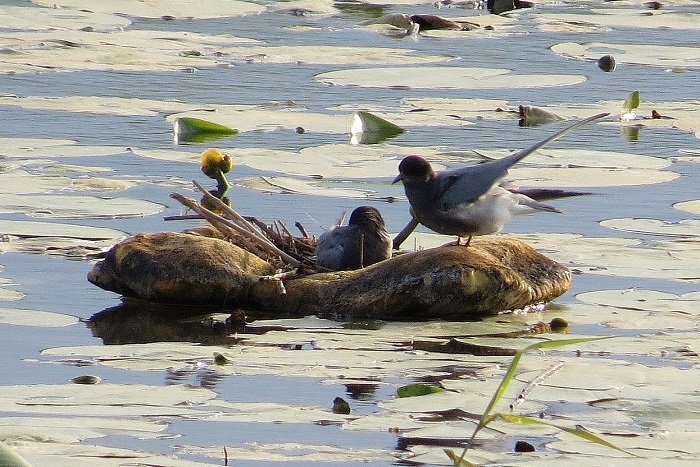Artificial 'islands' for the Black Terns

CABS project for the protection of endangered Black Terns in Brandenburg and Saxony-Anhalt
Black Tern have high demands on their breeding grounds: They must be in undisturbed waters, not too shallow and not too deep, sunny, without currents and above all, they must have one thing - plenty of aquatic plants! The black beauties build their nests on dead plant parts that float on the surface of the water. This breeding preference is so rare today, that the Black Tern has been brought to the brink of extinction. In the North German Plain about 1,000 to 1,300 pairs still breed today, in the last thirty years their population in Germany has decreased by more than 50%.
In all Western and Southern European countries the Black Tern is in significant decline, only in Eastern Europe are the populations still relatively stable. But here, too, the large remaining natural landscapes are threatened by the intensification of agriculture, road construction and ever increasing monoculture.

In order to help conserve and protect this highly endangered bird species, the Committee Against Bird Slaughter (CABS) has established a breeding colony with artificial nesting rafts in the nature reserve "Pritzerber See" - a off shoot of the Havel river, providing a shallow lake northwest of the city of Brandenburg - and on an old Elbe arm near Tangermünde. It all began with 30 small rafts that were established on Lake Pritzerberg back in spring 2007. Little by little, more islets were added here and on the Elbe near Tangermünde, and now there are more than 100 rafts.
The nesting aids must be reassembled each year by means of a rubber dinghy so that they are not destroyed by winter floods. The lightweight rafts are anchored to the bottom of the lake each spring with long strings that can compensate for fluctuations in water level after rainfall. The breeding rafts are dismantled for the winter.
The "Komitee-Seeschwalbenkolonie" is located directly on the edge of NABU's (The German BirdLife partner) Havel renaturation project, which is unique in Europe. Between the Pritzerbe and the mouth of the Havel into the Elbe, 18,700 hectares of floodplain landscape are in the process of being restored to their natural state over the next few years. Numerous old and dead arms of the Havel will also be restored, in which the Black Tern will probably find natural breeding grounds again in the future. Until then, CABS will continue to expand the colony at Lake Prizerberg!






